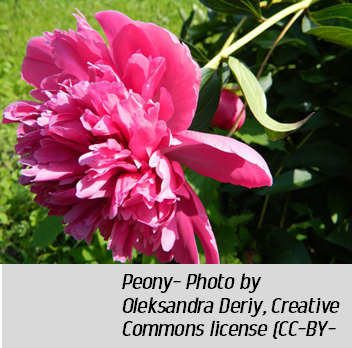|
|
by Cathy Bylinowski, MU Extension Horticulture Instructor May rains helped make June a great month to add new plants to your landscape and more variety to your vegetable and herb gardens. The possibilities are limitless. Here are a few suggestions:
Peonies: Long-lived Perennials- Peonies are putting on a beautiful show in our region now. They are a traditional flower of Memorial Day. In the 1800s, when the holiday was called Decoration Day, peonies were one of the few flowers in bloom in late May and were widely used to adorn the graves of fallen soldiers, said David Trinklein, University of Missouri Extension horticulturist. Today, they line the sidewalks and backyards of older homes and often serve as reminders of where farmsteads once stood. Peonies stand the test of time—lasting years, decades or even a century when undisturbed. Peonies thrive with relatively little care, and their self-sufficient nature makes them one of America’s most treasured garden flowers for weddings, fresh bouquets and grave decorations. They come in a range of colors including white, pink, and deep red. They are deer-resistant and, for the most part, pest-resistant. The nectar inside peony buds can attract ants, which are not harmful to the plants. After peonies bloom, the ants move on to find a new food source. Unlike most perennials, peonies rarely need to be divided, and they can be challenging to transplant, said Trinklein. Peonies do best when planted in sunny parts of your yard and in loamy soils. Space 3-4 feet apart in an area that receives at least six hours of sun per day. Avoid these mistakes with peonies: • Avoid planting in areas that get a lot of wind because peonies can become top-heavy when budded or flowering; stems can droop on the ground. • Avoid moving plants unless absolutely necessary. If you must move, do so in the fall after they have gone dormant. • Do not use an insecticide to kill ants on peonies. • Fertilize sparingly. Too much fertilizer, especially nitrogen, results in fewer flowers. Cut peonies do not last long, but when buds are immature (immature flower buds have the consistency of a marshmallow when gently squeezed), they can be cut and stored for later use. Cut at an angle, put stems in water and cover with cellophane. Store in the refrigerator and bring out later and allow to bloom. Sweet Potatoes: A Nutritious and Versatile Vegetable Crop- Sweet potatoes are definitely a warm season crop. They can be planted until mid-June and harvested in the fall. They need well-drained soil and full sun. Rooted stems, called slips, are sold at garden centers and nurseries now. Plant so that all the roots are covered by soil. Keep the sweet potato bed or row weeded until the plants get established. Once they start growing and vining, the abundant leaves shade out most weeds and help keep the soil moist. Harvest in September to early October before a frost or freeze occurs. Sweet potato leaves are edible, too. They can be prepared with a range of cooking methods similar to spinach. Here is an interesting article from University of California- Davis on using sweet potato leaves, which includes a simple recipe and instructions- https://horticulture.ucdavis.edu/blog/cooking-sweet-potato-leaves-for-nutrition Basil: A Fragrant and Edible Addition to your Garden. Basil loves warm temperatures. It also prefers a sunny location. Add basil to your yard by planting it in containers, in an herb garden, or mixed in with your vegetable or flower garden. Basil comes in a wide range of flavors, from the traditional Sweet Basil to the licorice-flavored Thai Basil. Here is a link to a University of Minnesota Extension article on adding basil to your gardening repertoire- https://extension.umn.edu/vegetables/growing-basil#choosing-basil-varieties-932110 For more gardening information, contact Cathy Bylinowski, MU Extension Horticulture Instructor, [email protected], 816-252-5051. Comments are closed.
|
Categories
All
Archives
July 2024
|
Grain Valley NewsGrain Valley News is a free community news source published weekly online. |
Contact Us |



 RSS Feed
RSS Feed
